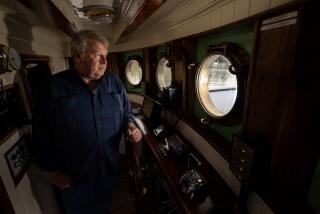By a Frog’s Own Light
- Share via
The frog in this story did not live in Los Angeles, or even in the South Coast Air Basin, but rather in Pakistan. But this is a story about light, the sort that opens the eyes of a visionary, so it is thereby a story about Southern California.
Sara Suleri, who is from Pakistan, told me that the bathrooms there are sunken and beautifully tiled affairs. Or at least hers was. Frogs sometimes come into them because, I suppose, the tiles are cool and smooth and wet, unlike the rest of Pakistan. And no one minds this because the frogs, like the tiles, are elegant and therefore not out of place.
But this frog came in and caught sight of his reflection in one of the tiles. And would not leave his reflection, but stayed there in rapt contemplation, hour on hour, day on day. Ovid tells the story of Narcissus, who, catching sight of his reflection in a pool, could not leave it but remained there contemplating his beauty. This is usually told as a story about the origins of one form of the pathology of the soul, but I used to find myself thinking that was quite odd, for in virtually every other case where people give their life over to the contemplation of beauty, we admire them and think of a taxonomy of virtues to describe them. And, of course, we remember Narcissus not for his looks but for his looking.
And so with this frog, who remained in his trance. Suleri worried about him and would pick him up and take him to other parts of the bathroom, hoping that he would eat and drink and get a little rest. But no. Always he returned to that tile and to his reflection, and in the end he died, perhaps of starvation, although it may be that he simply ascended willingly, as mystics sometimes do, into the realm of the gods.
I thought that if the frog had been returned to his family, put back in touch with a psyche and domestic actualities, perhaps his life might have been saved. So I said, “But Sara, why didn’t you take him outside?”
She said, “Well, I didn’t know, you see, what he was thinking about, and I thought that degree of commitment and perseverance deserved respect. If it had been me, I would not have wanted to be deprived of my vision.”
I asked her what sort of frog it was, and she said, “It never came up between us. He was a frog-size frog, smallish but not tiny when he sat in the palm of my hand. Of a clear, eloquent color, somewhere between green and brown, that spoke of the coherence of his quest. And he was very neat and tidy, a frog well put together. I did not ask him his name or his species.”
She went on to say that she had once met a very great poet, and that she had not asked the poet his name or where he got his degree because being a poet is a poet’s credentials, the President’s Commission on Higher Education notwithstanding.
This reminded me of Josephine Miles. She was a poet and scholar, raised in Southern California. One of my favorite poems is one of hers about a psychic metaphysician, what we would call a fortuneteller these days, who had a small house where he told his fortunes, on the road between Rialto and Riverside. The poem is called “Seer,” and in it Miles speaks of how the metaphysician’s hand, indeed all of the objects of the South Coast, “so take the light.” When I told her how much I liked her poem, she spoke to me of a frog she’d seen once at the edge of that same road. She said that what she saw, suddenly, is that a frog sees by a frog’s own light, and that happiness is just that--seeing by one’s own light, taking the light and making it one’s own.
“But,” she added, looking out of the window of a room that was not in Southern California, “first there must be the light.”


